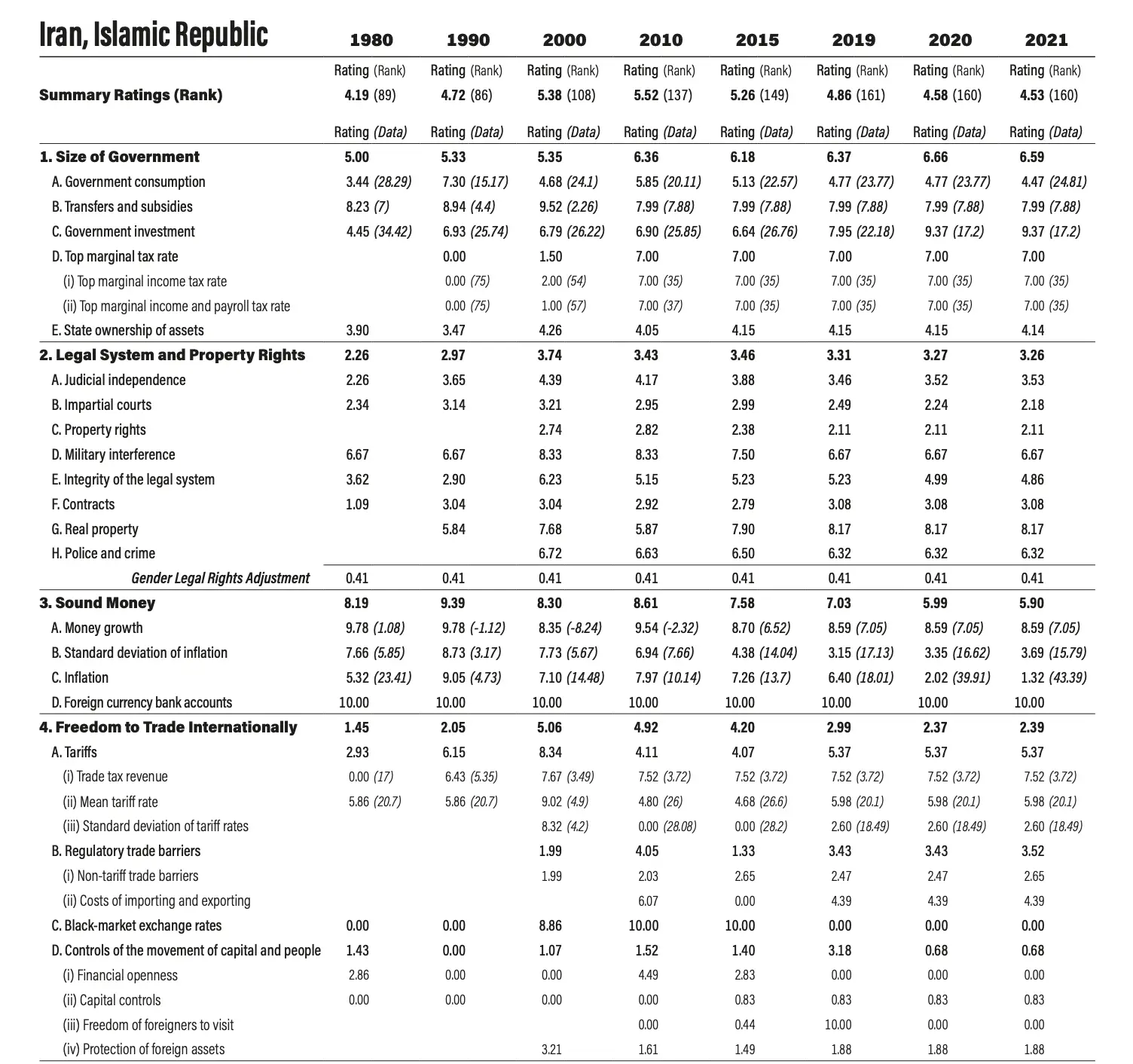iranintl – Iran’s economic freedom ranking for 2023 has placed it at a dismal 160 out of 165 countries surveyed, Canada’s leading think tank said in its latest report.
The Fraser Institute, in its latest Economic Freedom of the World report, measured the extent to which a country’s policies and institutions support economic freedom, with data from 2021 serving as the basis for the 2023 assessment.
With a paltry score of 4.53 out of 10, Iran shares the lowly position with Libya, outpacing only Yemen, Sudan, Syria, Zimbabwe, and Venezuela in terms of economic liberties. The other low-ranking countries all countries all have “brotherly” ties with the Islamic Republic.
Before the establishment of the Islamic regime, Iran stood at the 32nd position or the second quartile of all states at the time. The country leaped 10 steps from 42 in 1970 to 32 in 1975. Right after the 1979 revolution, Iran’s ranking plummeted to the 89th place in 1980.

The number one spot is now occupied by Singapore, followed by Hong Kong, Switzerland, New Zealand, the United States, Ireland, Denmark, Australia, the United Kingdom, and Canada.
The Fraser Institute’s annual assessment of economic freedom is measured in five broad areas: size of the government, legal system and property rights, sound monetary policy, freedom to trade internationally, and regulations. The research organization says the cornerstones of economic freedom are personal choice, voluntary exchange, freedom to enter markets and compete, and security of the person and privately-owned property, all of whom lagging behind the international standards.
The size of the Iranian government has been a central concern for the regime in recent years, leading to the launch of various initiatives under the banner of “building organizational agility” within state bodies. Unfortunately, these plans have failed to produce tangible results, primarily because the workers who should be laid off or redundant offices that should be removed are connected to influential figures within the regime.
As government spending, taxation, and the size of government-controlled enterprises continue to grow, government decision-making takes precedence over individual choice, resulting in a reduction in economic freedom. Yet, this factor achieved Iran’s highest score among the five categories, with a rating of 6.59 out of 10, placing Iran at 79th in this area.
In terms of the legal system and property rights, which measure protection of persons and their property, Iran scored 3.26. “If property is not secure, if individuals are not safe, if the judiciary is not impartial, or if the rule of law is undermined, then, again, economic freedom is reduced,” the Fraser institute says.
Iran’s monetary policy received a score of 5.90 in the category of Sound Money, essential for safeguarding property rights. The report highlights that when inflation is not only high but also volatile, individuals find it challenging to plan for the future, hindering the effective use of economic freedom. Approximately a year ago, Iran’s rial was trading at around 300,000 to the dollar, but in early May, it dropped to as low as 550,000. Currently, it stands above 490,000. This drastic devaluation of the rial illustrates the severity of inflation in Iran. In July, a lawmaker stated that the annual inflation rate was 120 percent, contrary to the 60 or 70 percent figures cited by various politicians and academics. According to World Bank figures from June, Iran’s food inflation rate stood at 78 percent.
Iran received its lowest score in the Freedom for International Trade category, with a rating of 2.39, the lowest among the 165 countries assessed by the Fraser Institute. The institute emphasizes that the essence of economic freedom lies in the freedom to exchange, which is hindered when government barriers to trade make it costly or even impossible to engage in commerce with businesses and individuals in other nations. Due to US sanctions, only a limited number of countries are willing to establish trade ties with Iran, risking retaliation from Washington and further isolating Iran.
 Shabtabnews In this dark night, I have lost my way – Arise from a corner, oh you the star of guidance.
Shabtabnews In this dark night, I have lost my way – Arise from a corner, oh you the star of guidance.



